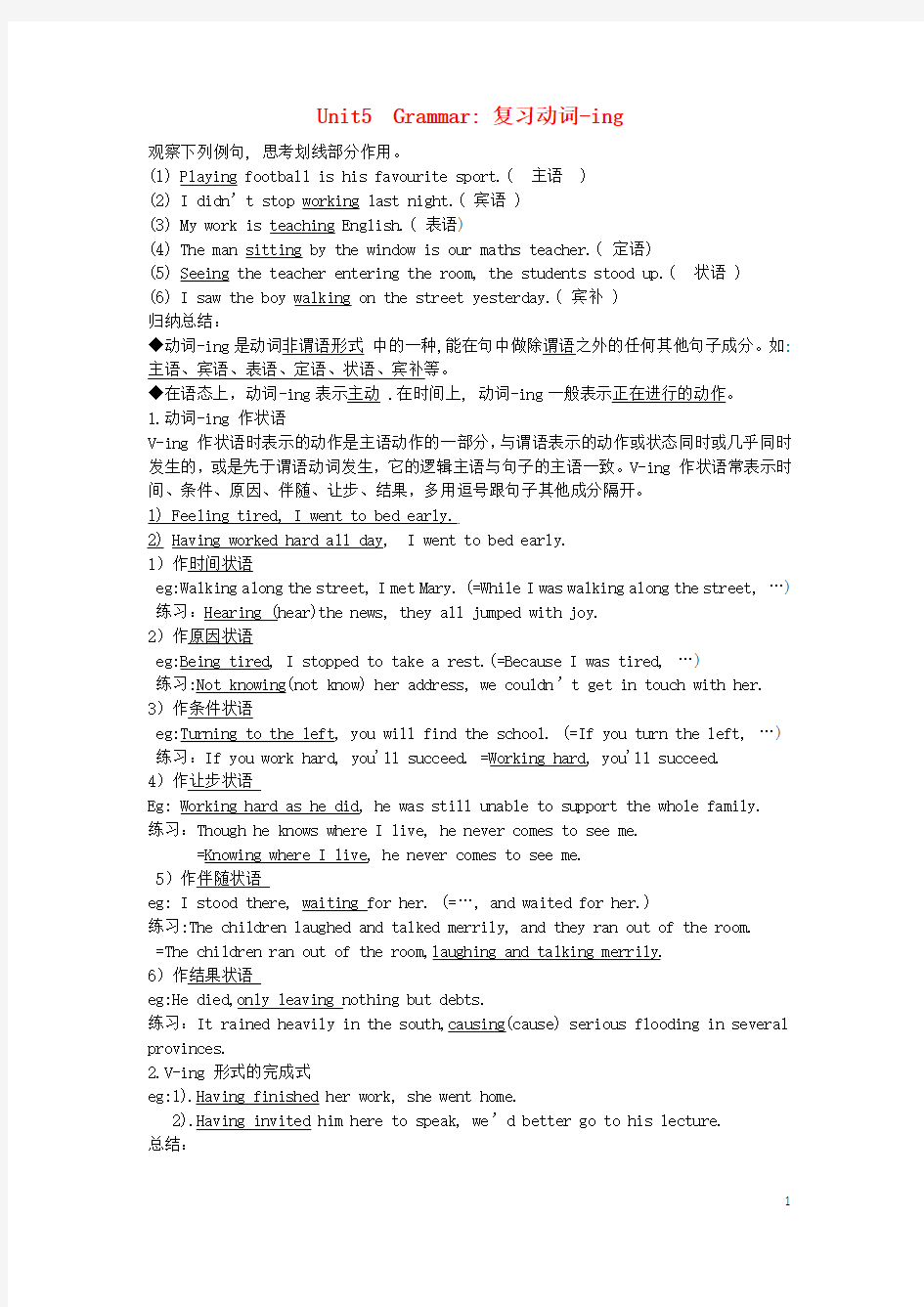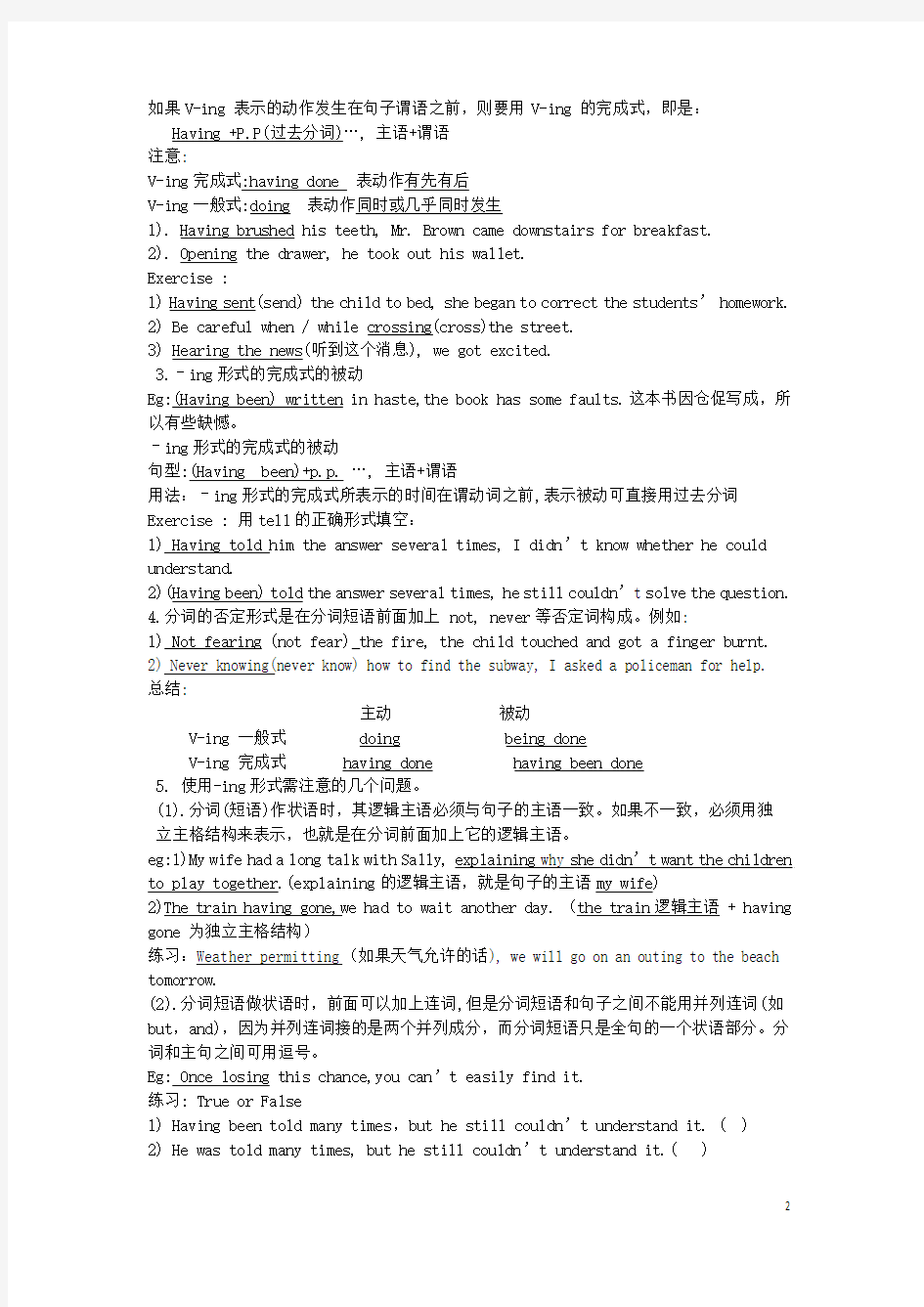Unit 5 The power of nature Grammar


Unit5 Grammar: 复习动词-ing
观察下列例句, 思考划线部分作用。
(1) Playing football is his favourite sport.( 主语 )
(2) I didn’t stop working last night.( 宾语 )
(3) My work is teaching English.( 表语)
(4) The man sitting by the window is our maths teacher.( 定语)
(5) Seeing the teacher entering the room, the students stood up.( 状语 )
(6) I saw the boy walking on the street yesterday.( 宾补 )
归纳总结:
◆动词-ing是动词非谓语形式中的一种,能在句中做除谓语之外的任何其他句子成分。如: 主语、宾语、表语、定语、状语、宾补等。
◆在语态上,动词-ing表示主动 .在时间上, 动词-ing一般表示正在进行的动作。
1.动词-ing 作状语
V-ing 作状语时表示的动作是主语动作的一部分,与谓语表示的动作或状态同时或几乎同时发生的,或是先于谓语动词发生,它的逻辑主语与句子的主语一致。V-ing 作状语常表示时间、条件、原因、伴随、让步、结果,多用逗号跟句子其他成分隔开。
1) Feeling tired, I went to bed early.
2) Having worked hard all day, I went to bed early.
1)作时间状语
eg:Walking along the street, I met Mary. (=While I was walking along the street, …) 练习:Hearing (hear)the news, they all jumped with joy.
2)作原因状语
eg:Being tired, I stopped to take a rest.(=Because I was tired, …)
练习:Not knowing(not know) her address, we couldn’t get in touch with her.
3)作条件状语
eg:Turning to the left, you will find the school. (=If you turn the left, …) 练习:If you work hard, you'll succeed. =Working hard, you'll succeed.
4)作让步状语
Eg: Working hard as he did, he was still unable to support the whole family.
练习:Though he knows where I live, he never comes to see me.
=Knowing where I live, he never comes to see me.
5)作伴随状语
eg: I stood there, waiting for her. (=…, and waited for her.)
练习:The children laughed and talked merrily, and they ran out of the room.
=The children ran out of the room,laughing and talking merrily.
6)作结果状语
eg:He died,only leaving nothing but debts.
练习:It rained heavily in the south,causing(cause) serious flooding in several provinces.
2.V-ing 形式的完成式
eg:1).Having finished her work, she went home.
2).Having invited him here to speak, we’d better go to his lecture.
总结:
如果V-ing 表示的动作发生在句子谓语之前,则要用V-ing 的完成式,即是:
Having +P.P(过去分词)…, 主语+谓语
注意:
V-ing完成式:having done 表动作有先有后
V-ing一般式:doing 表动作同时或几乎同时发生
1). Having brushed his teeth, Mr. Brown came downstairs for breakfast.
2). Opening the drawer, he took out his wallet.
Exercise :
1) Having sent(send) the child to bed, she began to correct the students’homework.
2) Be careful when / while crossing(cross)the street.
3) Hearing the news(听到这个消息), we got excited.
3.–ing形式的完成式的被动
Eg:(Having been) written in haste,the book has some faults.这本书因仓促写成,所以有些缺憾。
–ing形式的完成式的被动
句型:(Having been)+p.p. …, 主语+谓语
用法:–ing形式的完成式所表示的时间在谓动词之前,表示被动可直接用过去分词Exercise : 用tell的正确形式填空:
1) Having told him the answer several times, I didn’t know whether he could understand.
2)(Having been) told the answer several times, he still couldn’t solve the question.
4.分词的否定形式是在分词短语前面加上 not, never等否定词构成。例如:
1) Not fearing (not fear) the fire, the child touched and got a finger burnt.
2) Never knowing(never know) how to find the subway, I asked a policeman for help. 总结:
主动被动
V-ing 一般式 doing being done
V-ing 完成式 having done having been done
5. 使用-ing形式需注意的几个问题。
(1).分词(短语)作状语时,其逻辑主语必须与句子的主语一致。如果不一致,必须用独
立主格结构来表示,也就是在分词前面加上它的逻辑主语。
eg:1)My wife had a long talk with Sally, explaining why she didn’t want the children to play together.(explaining的逻辑主语,就是句子的主语my wife)
2)The train having gone,we had to wait another day.(the train逻辑主语 + having gone 为独立主格结构)
练习:Weather permitting(如果天气允许的话), we will go on an outing to the beach tomorrow.
(2).分词短语做状语时,前面可以加上连词,但是分词短语和句子之间不能用并列连词(如but,and),因为并列连词接的是两个并列成分,而分词短语只是全句的一个状语部分。分词和主句之间可用逗号。
Eg: Once losing this chance,you can’t easily find it.
练习: True or False
1) Having been told many times,but he still couldn’t understand it. ( )
2) He was told many times, but he still couldn’t understand it.( )
3) Having been told many times,he still couldn’t understand it. ( )
(3).-ing的一般式和完成式现在分词都可以表示先后接连发生的动作。在可能引起误解的场合应该用完成式现在分词表示先发生的动作。
练习: 1)Having brushed his teeth,Mr. Brown came downstairs for breakfast.
布朗先生刷过牙,就下楼来吃早饭。
2)Brushing his teeth, Mr. Brown came downstairs for breakfast.
布朗先生边刷牙,边下楼来吃早饭
Exercise 1: 每空填一词, 使该句与所给句子的意思相同。
1). Because he was ill, he didn’t go to school.
Being ill he didn’t go to school.
2). When she was walking along the street one day, she met an old friend of hers. Walking along the street one day, she met an old friend of hers.
3). If it is sunny, we’ll go for a picnic tomorrow.
It being sunny , we’ll go for a picnic tomorrow.
4). Because they had been warned by the teacher, they didn’t make such mistakes. Having been warned by the teacher, they didn’t make such mistakes.
5). After I got home, I found my books missing.
Having got home,I found my books missing.
6). When autumn comes, swallows go to the south.
Autumn coming,swallows go to the south.
7). As I had never seen a volcano erupting before, I was very excited.
Never having seen a volcano erupting before, I was very excited.
Exercise 2: 用动词的正确形式填空:
1). As the light turned green, I stood for a moment, not moving (move), and asked myself what I was going to do.
2). Having waited (wait) in the queue for half an hour, the old man suddenly realized he had left the cheque in the car.
3). (Having been) blamed(blame) for the breakdown of the school computer network, Alice was in low spirits.
4). He hurried to the booking office only to be told (tell) that all the tickets had been sold out.
5). European football is played in 80 countries, making (make) it the most popular sport in the world.
6). When asked (ask) why he went there, he said he was sent there to be trained for
a space flight.
7). When comparing(compare) different cultures, we often pay attention only to the differences without noticing the many similarities.
Exercise 3: 按要求完成句子
1) 她被蛇咬了三次后, 她看见蛇后就害怕。
Having been bitten by the snake for three times, she feels frightened
when seeing the snake.
2). 当玛丽发现她的手袋不见后,就去找警察帮忙。
Having found her handbag missing, Mary went to the police for help.
3). 当他们看见有一辆公共汽车经过时,就开始追逐它,认为这很好玩。
Seeing a bus passing by, they started to chase it, thinking it great fun.
4). 在1904年和1928年中断后,射击重回奥运会。
Having been canceled in 1904 and in 1928, shooting returned to the Olympics in 1932.
5). 近视率略高于50%,人数占世界第一。
The short-sightedness rate is a little higher than 50%, ranking the first place in the world.
6) 教英语是我的工作。Teaching English is my job.
7)和这男人争论这问题是没有用的。 It is no use arguing with the man over the matter. 8)你应该避免犯同样的错误。You should avoid making the same mistakes.
9)Tony因为没有被邀请去派对而感到不高兴。Tony was very happy for not having been invited to the party.
10)你的工作将会是照看这些孩子。Your job will be looking after the children
11)你听到有人在敲门吗?Do you hear someone knocking at the door?
12)我需要一台洗衣机。I need a washing machine.
Exercise 4
1.请说出-ing结构在Exercise 3的句子分别担任什么成分?
2.回忆后面常接-ing做宾语的动词。
finish, suggest, appreciate, consider(考虑), practice, delay, avoid, miss, imagine, enjoy, mind, risk, escape等及物动词以及can’t help (忍不住), be worth, keep on, insist on, feel like, put off等短语。
必修二unit5grammar
课题:M2U5“介词+关系代词”引导的定语从句 一.研读目标 掌握“介词+which/whom”引导的定语从句的结构与用法 二.基本用法 “介词+关系代词”引导定语从句时,介词的宾语只能用which(指物)或whom(指人),whose 既可指人也可指物,即介词+which/whom/whose. (三)填空(根据课文P34) 1.Have you ever dreamed of playing in front of thousands of people at a concert, ______________ everyone is clapping and appreciating your music? 2. They may start as a group of high-school students, ______________ practising their music in someone’s house is the first step to fame. 3. Later they may give performances in pubs or clubs, ______________ they are paid in cash. 4.The musicians were to play jokes on each other as well as play music, ______________________ was based loosely on the Beatles. 5.However, after a year or so______________ they became more serious about their work, the Monkees started to play and sing their own songs like a real band. 6.They produced a new record in 1996, ______________ they celebrated their former time as a real band. (四)“介词+关系代词”的种类 1.介词+which/whom 介词选用的方法:考虑三个因素: “一先,二动,三意义” ①I never forget the year____________I went to college. ②The policeman ____________Mr. Smith is talking in the office is my friend . ③Air, ____________man can’t live, is really important. 2.代词all,________,none, neither,________,many, few, the rest 等/数词 +介词+which/whom ④Mary has two brothers ,both of whom are doctors . ⑤There are forty students in our class in all, most of whom are from big cities . ⑥The factory produces half a million pairs of shoes every year, 80% of which are sold abroad . 3.the+___________/________+ which/whom ⑦China has hundreds of islands , the largest of which is Taiwan . ⑧I will talk to those students the homework of whom hasn't been done . 4.介词+__________+名词 ⑨We were grateful to Mr. Li, in whose car we had traveled home . 5. “介词+ which”常可以和when ,where ,why 互换 ⑩I'll never forget the days during which =___________ I worked with you . ①This is the office in which =____________I used to work . ②I'd like you to explain the reason for which =____________you were absent . 100. The weather turned out to be very good, ____ was more than we could expect. A. what B. which C. that D. it 101. After living in Pairs for fifty years he returned to the small town ____ he grew up as a child.
Unit5Grammar
Grammar Step 1 A Using may for possibility 1. If we do nothing, soon there may be none left! may 表示猜测,可能性(用于肯定句中或否定句中) 2. The bamboo forests are becoming smaller and smaller. As a result, pandas may not have a place to live or food to eat. may not do... 意为“可能不......” Step 2 Exercises In the zoo 1. The elephant is going towards the water. It ___________ (need ) a bath. 2. A little boy is crying when he sees the tigers. He ________ (be) afraid of them. 3. I cannot go near the lions and tigers. They __________ (hurt) me. 4. The baby panda is staying near its mother. It _______________ (be drinking) milk. 5. The monkeys are jumping around. They _______________ (be playing) with each other. 6. The horse is standing with its eyes closed. It ______________ (be sleeping). Step 3 B Using verbs + to-infinitives 1. 在英语中某些及物动词后接动词不定式作宾语, 常用的此类动词有: agree to do sth. 同意干 begin to do sth. 开始干 decide to do sth.决定干 fail to do sth. 做某事失败 forget to do sth. 忘记干 hope to do sth.希望干
